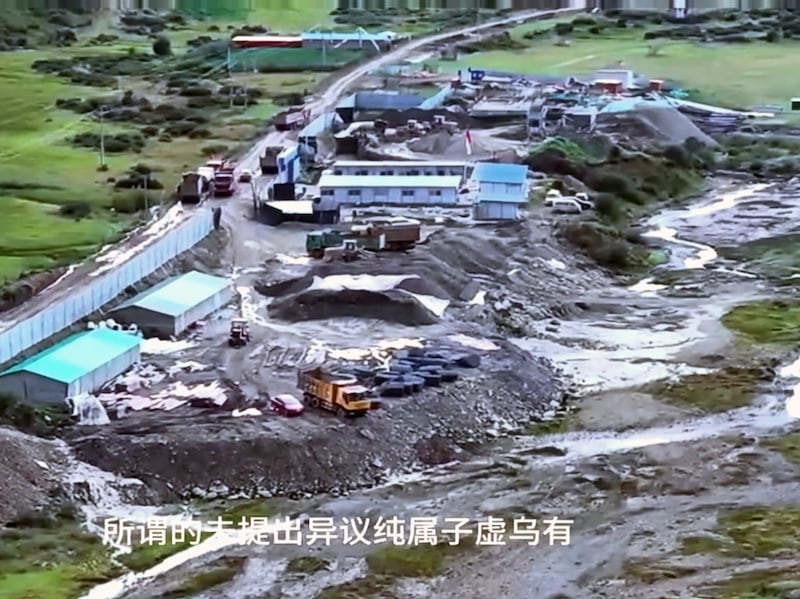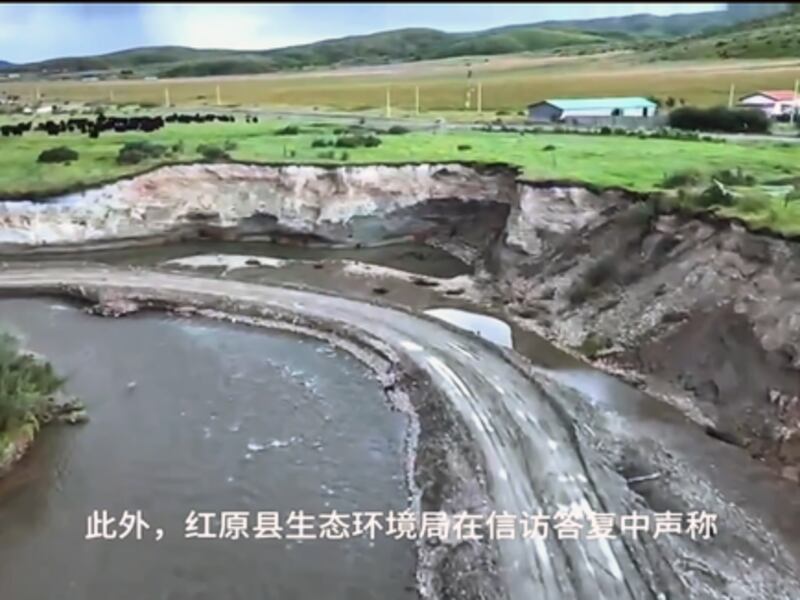By RFA Tibetan
A Tibetan environmental activist from China’s Sichuan province has been sentenced to eight months in prison, after he made a rare public appeal to authorities over a company he accused of illegally extracting sand and gravel from a river, two Tibetan sources told RFA.
Tsongon Tsering, 29, from Tsaruma village in Ngaba prefecture, called Aba in Chinese, openly posted a 5-minute video in which he held up his government ID card and accused Anhui Xianhe Construction Engineering Co. of the illegal activity along the Tsaruma River since May 2023.
On Oct. 27, the Kyungchu County People’s Court charged Tsering with “disturbing social order” and “provoking trouble and picking quarrels” for raising concerns about the environmental impact of the sand and gravel extraction, including reduced water levels, soil erosion and risk to homes located near the river, the sources said.
Until the news of his sentencing last week, Tsering’s whereabouts and condition had remained unknown since “a day or two after” Oct. 20, when authorities had summoned him a second time on the pretext of investigating the matter and detained him.
Authorities initially summoned Tsering and other villagers for questioning on Oct. 18, just two days after Tsering made the online public appeal — a rare move in Tibet, where speaking out against authorities or state-approved projects often leads to reprisals. At the time, they were all released back to their homes, but Tsering was detained.

Tsering is currently being held in Kyungchu County Prison and faces continued investigation and threats of extended sentencing, the sources told RFA.
“Authorities have also indicated to the family that the eight-month-long prison sentence is not final, emphasizing that they will continue to investigate the matter completely before making a conclusive ruling,” one of the sources said.
Speaking out
Tsering’s detention is an example of the risks Tibetans face for speaking out and the swift action authorities take to silence those who raise concerns about environmental degradation in their communities, especially when linked to Chinese companies.
Other Tibetan environmental defenders, such as Anya Sengdra, have faced persecution for their activism. In 2019, Chinese authorities sentenced Sengdra to a seven-year prison term on charges of disturbing social order after he complained online about corrupt officials, illegal mining and the hunting of protected wildlife.
“Authorities are treating Tsering’s environmental advocacy as criminal activity and accusing him of stirring up social unrest for personal vendettas,” said the second source. “His family and locals are under heavy surveillance and restrictions on sharing information about his case.”

Authorities acted quickly after Tsering’s video became popular on Chinese social media, shutting down his WeChat account and censoring all search terms related to his name on the platform.
The video, which gained significant attention online, had been widely shared by other platform users, but those posts were taken down as well, so that all related content had been censored by Oct. 17.
In the video, Tsering describes Anhui Xianhe Construction Engineering’s extensive mining operations and repeated appeals made by Tibetans to local authorities to take action against the company for causing environmental harm.
Additional reporting by Dickey Kundol. Translated by Dawa Dolma for RFA Tibetan. Edited by Tenzin Pema for RFA Tibetan, and by Roseanne Gerin and Joshua Lipes.
